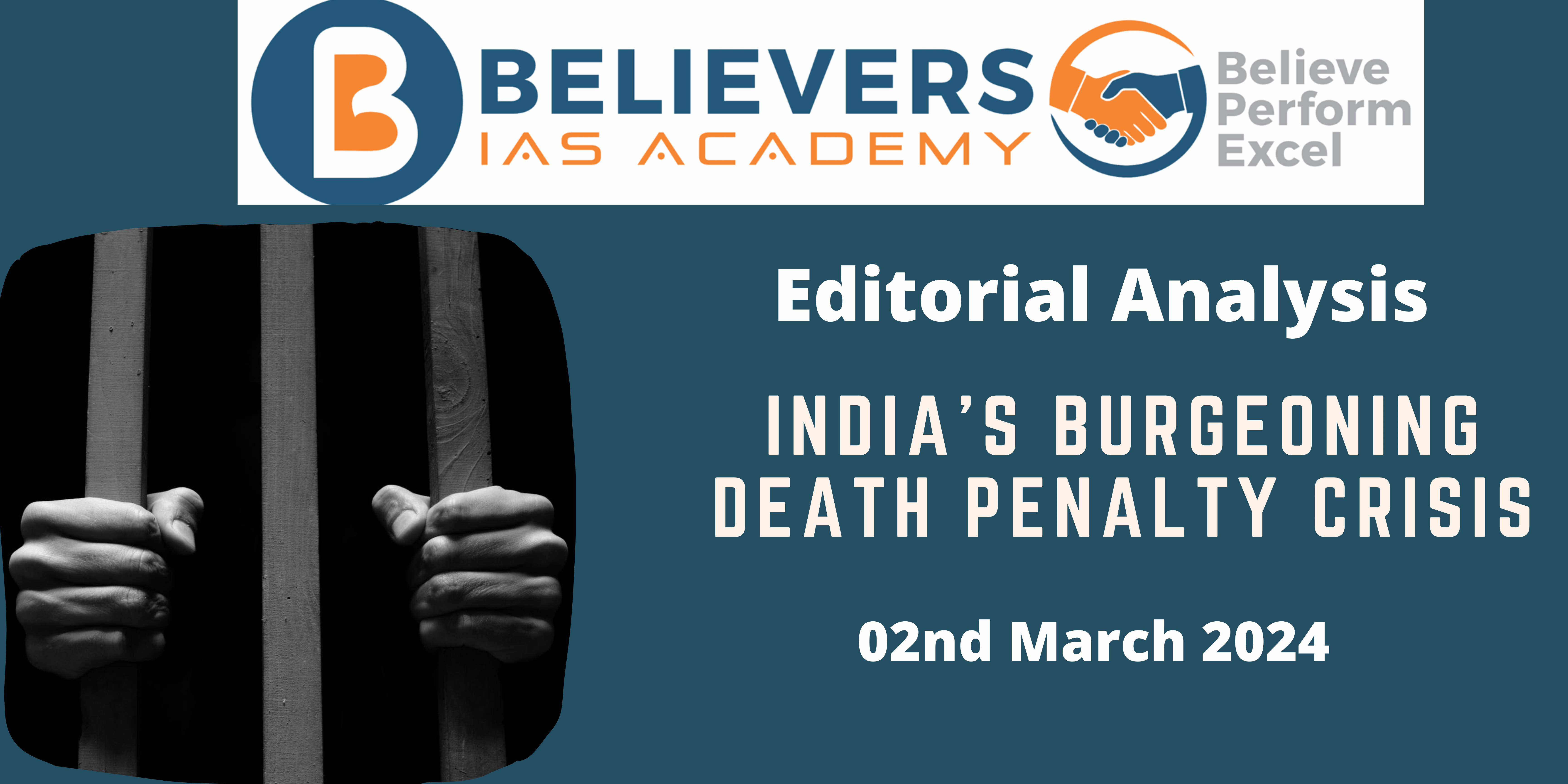India’s burgeoning death penalty crisis
Context:
India’s death row population has reached its highest-ever numbers since 2004, with 561 prisoners awaiting execution.
- The Supreme Court acquitted nearly 55% of the death row prisoners in the cases it heard in 2023, signaling a significant trend.
Relevance:
GS-02 (Polity)
Key Highlights:
- Despite efforts to reform death penalty sentencing, systemic failures persist, leading to a high rate of commutations and acquittals.
- Death row prisoners endure psychological distress and dehumanizing conditions, exacerbating the crisis.
Mains Question:
Discuss the challenges and systemic failures in India’s criminal justice system highlighted by the escalating death row population and high rate of acquittals. Evaluate the effectiveness of judicial interventions, such as the Supreme Court’s Constitution Bench on death penalty sentencing, in addressing these challenges. (250 words)
Dimensions of the Article:
- High Rate of Acquittals
- Plight of Death Row Prisoners
- Ineffectiveness of Supreme Court Interventions
- Arguments in Favor of the Death Penalty
- Arguments Against the Death Penalty
High Rate of Acquittals:
- The Supreme Court’s acquittal of nearly 55% of death row prisoners underscores systemic failures within the criminal justice system.
- These acquittals often result from fabricated evidence, manipulated reports, and dubious police practices.
- While the Court addresses sentencing concerns, the growing number of acquittals highlights the urgent need to address broader systemic issues.
Plight of Death Row Prisoners:
- Death row prisoners endure distressing conditions marked by constant fear and psychological anguish.
- Segregated from meaningful activities, they face violence and humiliation within prisons, leading to long-lasting psychological trauma.
- Moreover, the unjustified use of the death penalty exacerbates the crisis, subjecting individuals to dehumanizing punishment without reliable due process.
Ineffectiveness of Supreme Court Interventions:
- While the Supreme Court’s initiative to convene a Constitution Bench on death penalty sentencing is commendable, its effectiveness remains questionable.
- Past efforts to reform sentencing have failed to address systemic issues at trial courts, resulting in a disconnect between judicial directives and ground realities.
- The narrow focus on sentencing overlooks broader systemic flaws across the criminal justice process.
Arguments in Favor of the Death Penalty:
- Retribution: One of the fundamental principles of retribution emphasizes that individuals should receive punishment proportional to the severity of their crime. This argument asserts that genuine justice demands that individuals suffer consequences for their wrongdoing, commensurate with the gravity of their offense. In cases of murder, proponents argue that the appropriate punishment is death.
- Deterrence: Advocates of capital punishment often justify it by claiming that executing convicted murderers serves as a deterrent, dissuading potential offenders from committing similar crimes. They argue that the threat of death penalty discourages individuals from engaging in acts of violence, thus potentially saving lives. Additionally, supporters contend that the death penalty offers closure to the families of victims, providing them with a sense of justice and resolution.
- Rehabilitation: Some proponents highlight the potential for spiritual and moral rehabilitation afforded by the death penalty. They argue that condemned individuals may use the time before their execution to reflect, repent, and seek redemption. Drawing on religious perspectives, proponents suggest that accepting death as punishment allows offenders to atone for their crimes and find redemption, thereby demonstrating the rehabilitative potential of capital punishment.
Arguments Against the Death Penalty:
- Lack of Deterrence: Critics of the death penalty point to the lack of conclusive evidence supporting its deterrent effect. They argue that the threat of execution does not necessarily deter individuals from committing capital crimes, especially in cases where offenders act impulsively or suffer from mental illness. Moreover, the persistence of crimes despite the existence of death penalty laws raises questions about its efficacy as a deterrent.
- Risk of Executing the Innocent: One of the most compelling arguments against capital punishment is the risk of wrongful convictions and the execution of innocent individuals. Critics contend that flaws in the justice system, such as mistaken eyewitness testimony or inadequate legal representation, can lead to wrongful convictions and tragic miscarriages of justice. As long as human fallibility persists within the justice system, the possibility of executing innocent people remains a grave concern.
- Moral and Ethical Considerations: Opponents of the death penalty argue that retribution, particularly in the form of state-sanctioned killing, is morally objectionable and tantamount to legalized vengeance. They contend that executing individuals does not address the root causes of crime and perpetuates a cycle of violence. Furthermore, many countries and international bodies have abolished or imposed moratoriums on the death penalty, reflecting a global consensus against its use.
- Lack of Rehabilitation: Critics also question the rehabilitative value of capital punishment, arguing that it fails to reintegrate offenders into society or address the underlying factors contributing to criminal behavior. Instead of offering opportunities for redemption and rehabilitation, the death penalty permanently removes individuals from society, precluding any possibility of their reintegration or transformation.
Way Forward:
- The escalating death row population and high rate of acquittals underscore the urgent need for comprehensive reform in India’s criminal justice system. Efforts to address sentencing concerns must be complemented by measures to tackle systemic failures, from police investigations to prison conditions.
- The Supreme Court’s interventions should prioritize holistic reforms rather than narrow sentencing directives. Moreover, ensuring access to counseling and support for individuals affected by the death penalty is essential for promoting mental well-being and human dignity.




